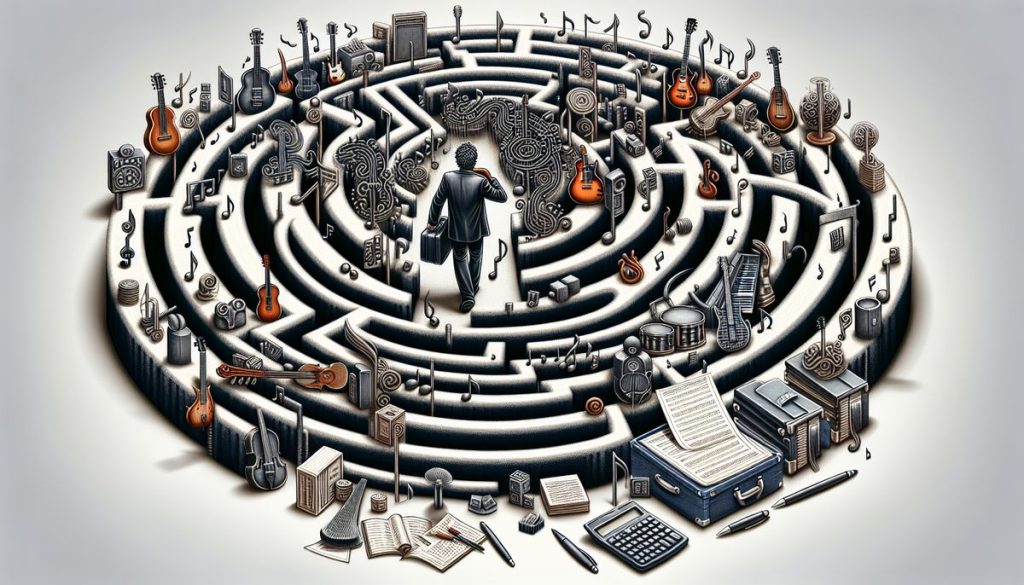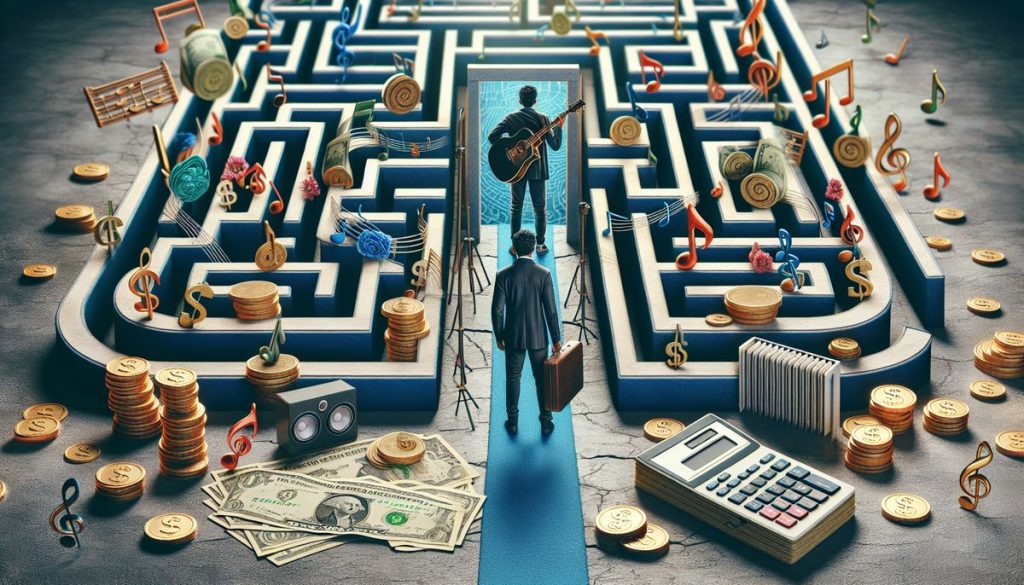Navigating the Music Industry: Understanding Royalties and Rights Organizations Worldwide
Written by DJ Prodigee on Tue Mar, 2024
The music industry is a complex tapestry woven with various threads of creativity, business, and legalities. As an up-and-coming musical artist, understanding the intricacies of royalties and rights organizations is crucial to navigate this landscape successfully. This article delves into the different types of royalties, the role of rights organizations worldwide, and the significance of master rights in music licensing. It’s designed to unravel the ingenious revenue generation model of the music business, offering insights into the strategies and core intentions that drive the industry. We’ll also explore the licensing labyrinth and how to cash in on copyright, ensuring you’re well-equipped to make informed decisions about your music career.
Key Takeaways
- Understanding royalties and affiliating with rights organizations is essential for artists to receive compensation for the use of their music.
- Master rights are pivotal for maintaining control over your music and ensuring you’re compensated for its use in various mediums.
- Navigating music licensing requires knowledge of sync, mechanical, and performance licenses to avoid legal pitfalls and maximize revenue.
- Copyright and collective management organizations play a crucial role in monitoring music use and collecting royalties on behalf of artists.
- The digital age is reshaping music rights and distribution, making it vital for artists to stay informed and adapt to new industry standards.
Royalties and Rights: The Unsung Heroes of Music Biz
Understanding the ABCs of Royalties
Let’s face it, the world of music royalties can be about as clear as a heavy metal concert in a fog machine factory. But fear not, my fellow rockstars and pop divas, for we’re about to demystify this mosh pit of money matters. Royalties are the bread and butter for any tune-crafter, and getting a grip on them is like learning the secret handshake to the exclusive club of ‘Getting Paid’.
Royalties are those sweet, sweet pennies that drop into your piggy bank every time someone jams to your tunes. Whether it’s a radio station blasting your latest hit or a coffee shop serenading its latte-sippers with your acoustic melodies, those plays equal pay. But how do you make sure you’re collecting all your cash? Cue the rights organizations!
- Rights Organizations: The bouncers of the music biz.
- Mechanical Licenses: Your song’s ticket to ride the airwaves.
- Performance Royalties: The applause that keeps on giving—in cash.
Remember, joining a rights organization is like hiring a financial bodyguard for your music. They keep an eye out for every time your song struts its stuff in public and make sure you get your cut of the action.
So, whether you’re a shower singer turned chart-topper or a garage band gone global, understanding royalties is crucial. It’s not just about counting streams; it’s about making sure every note you play pays off. And who doesn’t want to make money while they sleep? That’s the dream, folks—the dream!
The Global Maestros: Rights Organizations Around the World
Let’s face it, without the rights organizations, our beloved tunes would be like a guitar without strings – totally useless. These global maestros are the backstage rockstars who make sure that every time your jam is played, you get paid. Royalties are not just a buzzword; they’re the bread and butter for musicians, songwriters, and producers alike.
Here’s a quick rundown of what these organizations do:
- They keep track of where and how often your music is played.
- They collect royalties from radio stations, streaming services, and anywhere else your tune is belting out.
- They distribute the moolah to the rightful owners – that’s you, the artists!
Remember, joining a rights organization is like getting a VIP pass to the music money train. Don’t miss out on the chance to monetize your music and keep your wallet as full as a double bass drum kick.
So, whether you’re a solo act or part of a band, understanding the ABCs of royalties and getting cozy with these rights organizations is crucial. They’re the unsung heroes who ensure that your creative genius doesn’t just echo into the void – it echoes into your bank account!
Why Joining the Bandwagon of Rights Societies Rocks
Let’s face it, being part of a rights society is like having a backstage pass to the rock concert of the music biz. You’re not just another face in the crowd; you’re part of the inner circle. Royalties can be a real headache, but rights organizations are the aspirin. They work tirelessly to ensure that your tunes aren’t just free-floating notes in the air but are actually putting some sweet moolah in your pocket.
- They keep track of who’s playing your music.
- They collect the dough from those endless streams and plays.
- They make sure you get your fair share, without you having to lift a finger.
Remember, music rights not only protect your interests as an artist but also keep the whole industry jamming to the tune of fairness and prosperity.
So, if you’re still pondering whether to join the rights society bandwagon, think of it as the VIP ticket to your financial peace of mind. It’s a no-brainer, really. You get to focus on strumming that guitar or hitting those high notes while someone else takes care of the boring stuff. And who doesn’t love having a team of unsung heroes making sure every note you play pays off?
Master Rights: The Puppet Masters of Your Tunes
Decoding the DNA of Master Rights
Think of master rights as the overlords of your tunes, ruling over the land of music with an iron fist—or should I say, an iron record? Master rights are the golden keys to the kingdom of monetization, and if you’re not holding onto them tightly, you might just find yourself a court jester in your own royal court of rhythm.
- Who’s the boss? You, if you control your master rights.
- Show me the money: These rights dictate who gets paid when and where.
- Creative control: Keep your sound from being twisted by other nefarious producers.
Remember, losing grip on your master rights is like letting someone else tune your guitar before a big show. It might sound okay, but it’s not quite the rockstar solo you had in mind.
So, before you sign away your soul—or at least your latest single—make sure you’re not just nodding along to the beat of someone else’s drum machine. Get the lowdown on your master rights, and keep your music, and your revenue, marching to the beat of your own drum.
Why Your Studio Sessions Are More Than Just Jamming
Think your studio sessions are just a bunch of musos noodling around until a tune pops out? Think again, my friend! Those sessions are where the magic happens, and every second counts. It’s not just about laying down tracks; it’s about crafting a masterpiece that’ll have folks tapping their toes and reaching for their wallets.
- Setting the vibe: A producer’s like a wizard, conjuring the perfect atmosphere.
- Picking the takes: It’s like a musical buffet, and only the tastiest bits make the cut.
- Shaping the sound: With the engineers, producers mold the sonic clay into your earworm of tomorrow.
Remember, the studio is your musical laboratory, where experiments can lead to chart-topping formulas or ear-splitting explosions. Handle with care!
And let’s not forget the moolah aspect. Those studio hours are an investment, and not just in pizza for the band. You’re building an asset, a shiny musical nugget that’ll pay dividends in royalties and rights. So, next time you’re in the booth, give a nod to the unsung heroes—the producers, engineers, and all the studio elves that make your tunes sparkle.
The Fine Print: Keeping Control of Your Sound
Let’s face it, the fine print on contracts can be as tiny as the chances of your cat letting you sleep past 6 AM. But just like your furry alarm clock, it’s crucial to pay attention to it. Mastering the master rights is like holding the reins of a wild stallion; it’s all about control, baby! With your hands firmly on those reins, you can steer your music career away from the cliffs of obscurity and into the lush valleys of royalty checks.
Remember, your studio sessions are more than just a group of friends jamming out. They’re the golden eggs of your musical goose, and you better believe that everyone wants a piece of that omelette.
Here’s a little cheat sheet to keep you from signing away your firstborn song:
- Read the contract: Yes, all of it. Even the part that looks like it was written by someone who only uses the top row of their keyboard.
- Ask questions: If something smells fishier than a tuna sandwich left in the sun, ask about it.
- Get a lawyer: Preferably one that doesn’t charge by the syllable.
- Negotiate: You’re the rockstar, after all. Flex those negotiation muscles!
By keeping these points in mind, you’ll ensure that the only thing you’re signing is autographs, not away your rights.
The Licensing Labyrinth: Navigating the Legal Jungle
Sync, Mechanical, and Performance: The Licensing Triad
Welcome to the wild world of music licensing, where the sync, mechanical, and public performance licenses are the three musketeers keeping your tunes afloat in the sea of the industry. Boldly navigating these waters can mean the difference between a treasure chest and a sunken ship.
- Sync licensing: The intricate dance of matching your music to visual media. It’s like finding the perfect partner for prom night, but with more paperwork.
- Mechanical licensing: This one’s all about reproduction. Every time your track is pressed onto vinyl, popped into a CD, or streamed online, mechanical royalties should be jingling in your pocket.
- Public performance licenses: Whether it’s a live gig, radio play, or elevator music, if your song is playing, you should be paying… attention to these royalties!
Remember, folks, in the music biz, it’s not just about the notes you play; it’s about the notes you get paid. So, keep your eyes on the prize and your hands on the rights!
And hey, if you’re feeling lost in the licensing labyrinth, just think of it as a game of Monopoly. You want to own all the properties (rights) so you can build houses (revenue streams) and eventually, a big ol’ hotel (your music empire). Just watch out for those sneaky ‘Go to Jail’ cards (bad deals).
Backstage Pass: Understanding Your Rights
Alright, you talented bunch of melody makers, let’s get down to the nitty-gritty of your rights, because let’s face it, without them, you’re just a sitting duck in a pond full of sharks. Knowing your rights is like having a backstage pass to your own career
- Sync licenses: Your ticket to the movies, TV, and ads.
- Mechanical licenses: These little gems let you cash in every time someone covers your tune or presses it onto CDs and vinyl.
- Performance licenses: The bread and butter for when your jam gets played live or on the radio.
Remember, folks, these licenses are the lifeblood of your music’s journey from your brain to the bank.
And if you’re thinking, ‘But I just wanna play my guitar and sip on a cold one,’ well, my friend, that’s where legal counsel comes in. They’re like the GPS for your music career, keeping you on track and out of the ditches. So, before you sign anything that could turn your hit into a horror story, get yourself a lawyer who knows their legalese from their lasagna.
And hey, while you’re at it, join a rights organization. They’re like your fairy godmother, but instead of glass slippers, they give you royalty checks. Sweet, right?
Avoiding the Broom Closet: Smart Licensing Strategies
Ever felt like you’re playing a game of musical chairs with licensing, and the music stopped leaving you without a seat? Don’t be that artist who gets swept into the broom closet of bad deals. Instead, let’s waltz through some smart licensing strategies that’ll keep you in the spotlight.
First off, remember that licensing is your golden ticket to monetizing your music. But not all tickets are created equal:
- Sync licenses: Your tune’s plus-one to the big screen ball.
- Mechanical licenses: The unsung hero that keeps your tracks spinning.
- Public performance licenses: The passport for your music to globetrot.
Keep a tight grip on your master license—it’s the crown jewel that rules them all.
And hey, while you’re at it, make sure to buddy up with a legal eagle who can spot a sneaky clause from a mile away. Because when it comes to your music, you want to be the one calling the encore, not stuck cleaning up after the show.
Show Me the Money: Cashing In on Copyright
The Sweet Sound of Passive Income
Let’s face it, who wouldn’t want to wake up to the sound of ka-ching without lifting a finger? But in the music biz, passive income is like that gym membership you bought in January – it only works if you put in the effort upfront. The royalties from your toe-tapping tunes are the sweetest of fruits, hanging there ripe for the picking, long after you’ve rocked the recording booth.
- Record sales and streaming? Check.
- Merch flying off the virtual shelves? Double-check.
- Your catchy chorus in a movie? That’s the jackpot, baby!
Passive income in music is about setting up your dominos so that when fame hits, they fall in a perfectly orchestrated cascade of cash. But remember, it’s not just about making a splash with your debut album. It’s a marathon, not a sprint, and your bank account will thank you for every smart move you make today.
The beauty of passive income is that once the heavy lifting is done, your music keeps on giving, like a gift that doesn’t stop at Christmas. It’s the revenue that keeps on living, even when you’re off living your life.
Public Performance and Phonograms: Know Your Worth
Ever felt like a human jukebox, playing your tunes for the masses but not seeing the coin drop? Well, it’s time to tune up your knowledge on public performance royalties. When your jam hits the airwaves, whether it’s through MizFitz Radio‘s electronic beats or the local diner’s dusty speakers, you’re owed more than just a head nod.
Public performance isn’t just about live gigs; it’s the bread and butter for many artists when their tracks are played on radio, TV, or online. And let’s not forget phonograms—those shiny discs or digital files that carry your sound. Both you and the financial producer of your masterpiece should hear the sweet sound of ka-ching every time it’s played publicly.
Remember, it’s not just about album sales and streaming. Your music, when communicated to the public, is a performance earning its keep.
So, how do you make sure you’re not left out of pocket? Here’s a quick checklist:
- Register with a copyright collecting society.
- Ensure your music is properly licensed.
- Keep track of where and how your music is being used.
- Join forces with collective management organizations to monitor usage.
By hitting the right notes with these steps, you’ll be conducting your own symphony of earnings in no time!
The Evolution of Music Rights in the Digital Age
As we surf the tidal wave of the digital revolution, music rights are doing the cha-cha, evolving to the beat of new technologies. The digital age has been a game-changer, transforming how tunes are distributed and monetized. It’s like every artist’s track has been given a backstage pass to the global stage, but with great power comes great responsibility – and a bit of a headache.
The Music Modernization Act is like the new kid on the block, promising to shake things up with a ‘willing buyer, willing seller’ standard. But let’s not pop the champagne just yet; government-set royalty rates and legal tussles still play the same old tune in the background.
In the digital playground, understanding royalty types like sync, mechanical, and performance is more crucial than ever. It’s the difference between riding the wave or wiping out financially.
Here’s a quick rundown of why keeping up with the times is essential:
- Self-produced tracks are the new vinyl, and knowing the ropes can mean more moolah in your pocket.
- The digital landscape is vast – think global distribution at the click of a button.
- But beware, the digital jungle is also dense with legal vines ready to trip you up.
Remember, the essence of the music biz hasn’t changed; it’s still all about supply, demand, and what the fans are jamming to. The digital age just added more speakers to the party.
Rocking Out with Royalties: The Encore
And there you have it, folks—the grand tour of the music industry’s funhouse, where royalties are the golden tickets and rights organizations are the bouncers. Whether you’re a fresh-faced artist or a seasoned pro, remember: knowledge of this biz is your VIP pass to the afterparty. So, keep your eyes peeled, your contracts tight, and your affiliations in check. Who knows? With a little luck and a lot of legalese, you might just find yourself swimming in a pool of passive income, laughing all the way to the bank. Until then, keep strumming, keep humming, and may your royalties ever be in your favor!







